Buying a used car doesn’t have to be a challenge! We’ve put together this guide to explain the complete process – from deciding what model to buy, to figuring out how you’ll pay for it, and what you should do when you’re test driving it.
Keep reading for answers to all your used-car-buying questions. For more options, take a look at Motorpoint’s huge selection of nearly new cars backed by our quality guarantee.
- Benefits of buying a used car
- What to do before buying a used car
- What’s the best way to buy a used car?
- Can you test-drive a used car?
- Buying a used car online
- Best place to buy a used car
- What to look out for when buying a used car
- What should I ask when buying a used car?
- Best time to buy a used car
- What rights and protection do I have when buying a used car?
Benefits of buying a used car
Should I buy a new or used car?
| Pros of buying a used car | Cons of buying a used car |
| Cheaper than buying the same car brand new | Interest rates for finance on used cars are typically more expensive than new cars |
| Enjoy a larger/more premium/higher-spec car for your budget | Shorter warranty period than for new cars |
| Wider choice of makes and models | You don’t always know the car’s history and how it’s been used |
| Newer used cars still come with the manufacturer’s warranty cover | Any delivery/transport fees are not included in the price of the car |
| Available instantly – no waiting for a car to be built | You don’t get to choose the exact spec and optional extras |
| Used cars suffer less depreciation than new cars | |
| Most used car sellers will let you transfer a car to a closer store – ideal if your perfect car is the other side of the country | |
| You won’t be paying for any optional extras that were ordered by the first owner | |
| Nearly new cars can feel as fresh as brand-new ones | |
| Trade sellers offer protection to buyers |
Are used cars reliable?
Used cars can be just as reliable as new cars, especially if previous owners have kept up with regular service intervals. Most used car models have been on the market for a few years – this means that design issues that were missed when the car first launched will have had more time to get fixed by the manufacturer, which helps make these models more reliable in the long run.
Bear in mind that, as a car gets older, it will continue to require maintenance to keep it running properly. An older used car will generally cost a little more in maintenance as parts wear out and need replacing. Buying an extended warranty for your used car can help shield you from large, unexpected maintenance costs.
Are used cars good value for money?
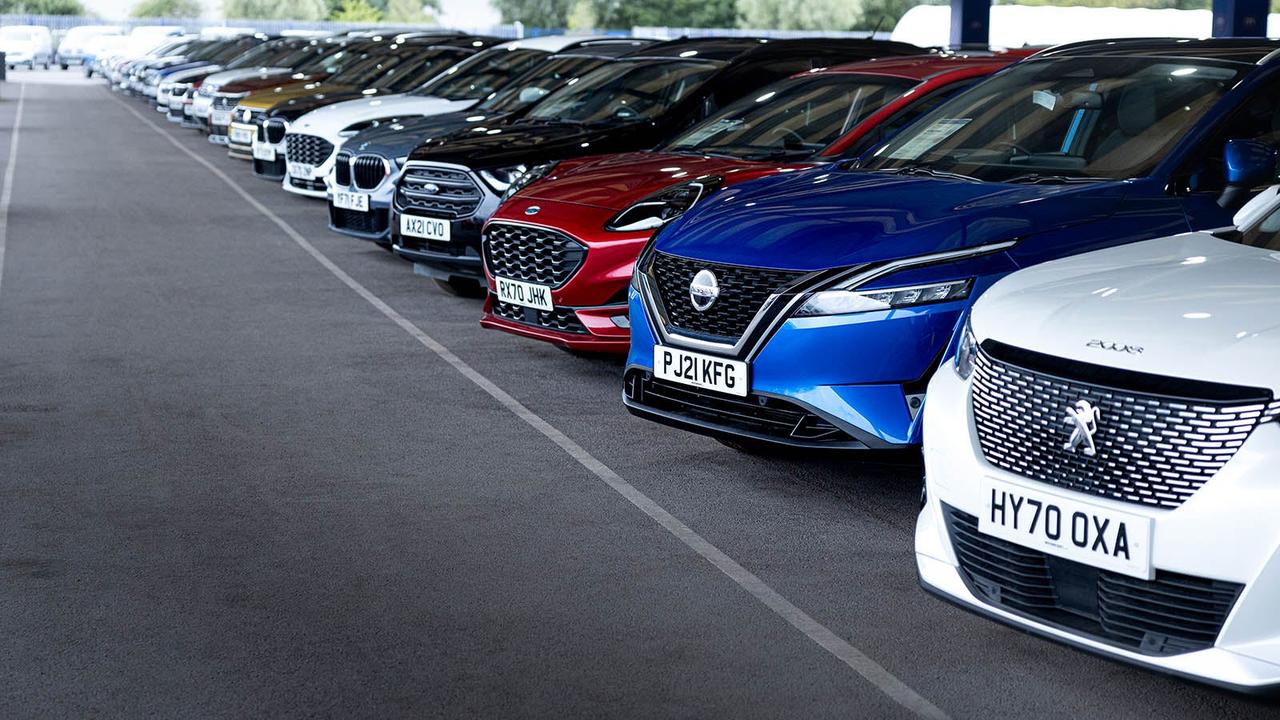
Generally speaking, used cars represent better value for money than brand-new cars. You get almost entirely the same experience as the car’s first owner but for less money.
As soon as a car gains its number plates, it’s classed as pre-registered – or, in other words, used. If you check out our newest used cars, you’ll see that they only have delivery mileage but are often thousands of pounds cheaper than an unregistered equivalent.
It’s worth noting that electric car depreciation is particularly strong in the first year or two. So a nearly new electric car typically represents a huge bargain compared to the manufacturer’s asking price.
What to do before buying a used car
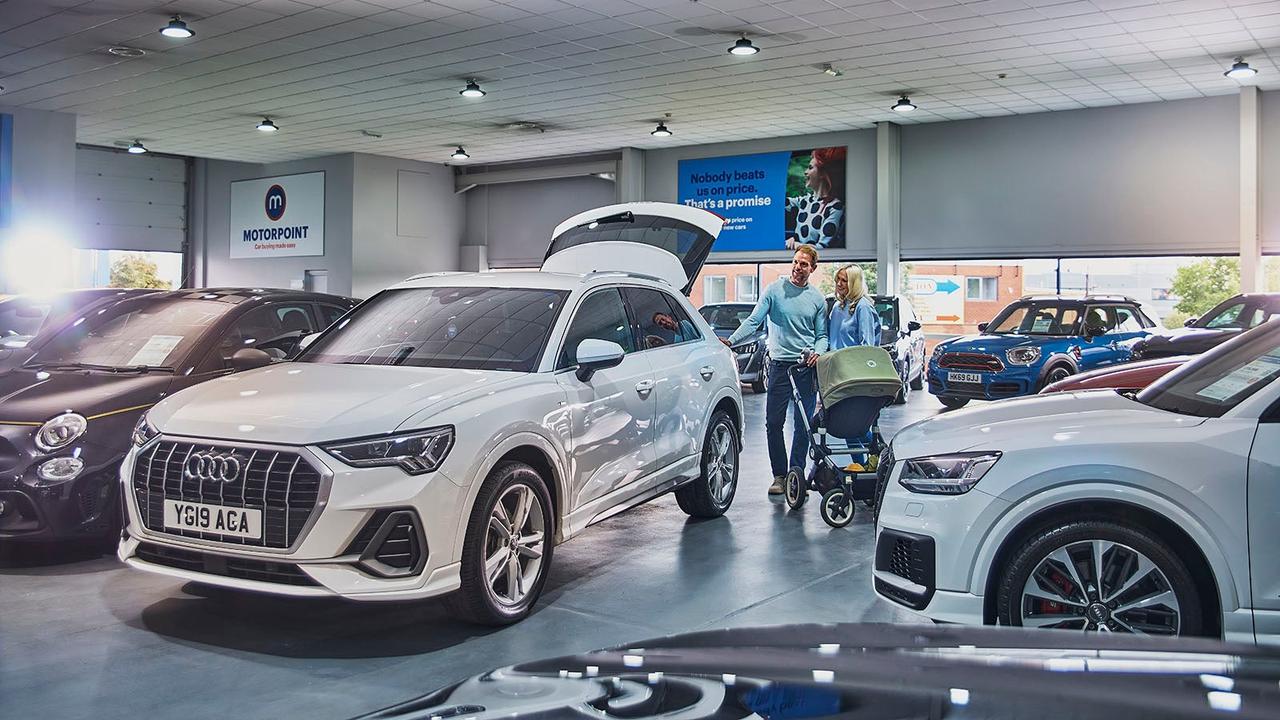
It might seem like unnecessary hassle, but it’s absolutely worth shopping around to find the best used car for you. After all, this is one of the biggest purchases you’re likely to make, and you’ll probably be keeping it for a few years – so it’s worth getting something you’ll enjoy living with.
What kind of car do I need?
Questions to ask yourself include:
- How many seats do I need? If you’re a single person or in a couple, you may not need a big car with lots of seats, but families will need more
- How much stuff do I need to carry? Do you need a big boot for dogs/prams/hobby equipment, or can you get away with a smaller car?
- Will an SUV be the best choice? SUVs aren’t just for style – the high driving position gives a commanding view of the road, it’s easier to install kids into car seats, and access is easier if you have a bad back or mobility issues. Though, they’re usually pricier than other body styles
- What type of engine is best for me? Diesel engines are good for long distances or for towing heavy loads, but they’re not very well suited to frequent short trips. Petrol cars are excellent all-rounders, while hybrid cars can save you lots of money on fuel if you’re mainly driving around town
- Can I fit an electric car into my lifestyle? If you’ve got a dedicated parking space (such as a driveway) and you don’t need to rely on public chargers, an electric car is likely to suit your lifestyle. Many modern EVs can cover 250-300 miles to a charge, and home charging is very cheap. Read our full guide to buying an EV for more info
What kind of car do I want?
This question is a little more subjective. What models and brands do you like? Carmakers put a lot of thought into the styling and features on their vehicles, so there’s probably something out there that’ll float your boat. Do you like the handsome, imposing styling of an Audi or BMW, or do you prefer the friendly face you get on a Fiat 500 or a Mini?
Taking time to think about what models you like and don’t like will help narrow down your search. It might also be worth looking into the range of colours and trim levels offered on the models you’ve got your eye on, so you can start hunting for your ideal version.
What car can I afford?
This question might be the most important of all. All cars on sale will have an outright purchase price but few buyers are able to stump up the entire cost of their car – often many thousands of pounds – in one go. Instead, new and used car shoppers often finance all or part of the vehicle’s cost.
That means, when considering what cars are affordable for you, it’s often more useful to consider whether you can afford the monthly finance repayments from your budget, rather than the outright cost. Finance deals often start with a lump-sum deposit, so it’s also worth making sure that you can afford this one-off payment.
What’s the best way to buy a used car?
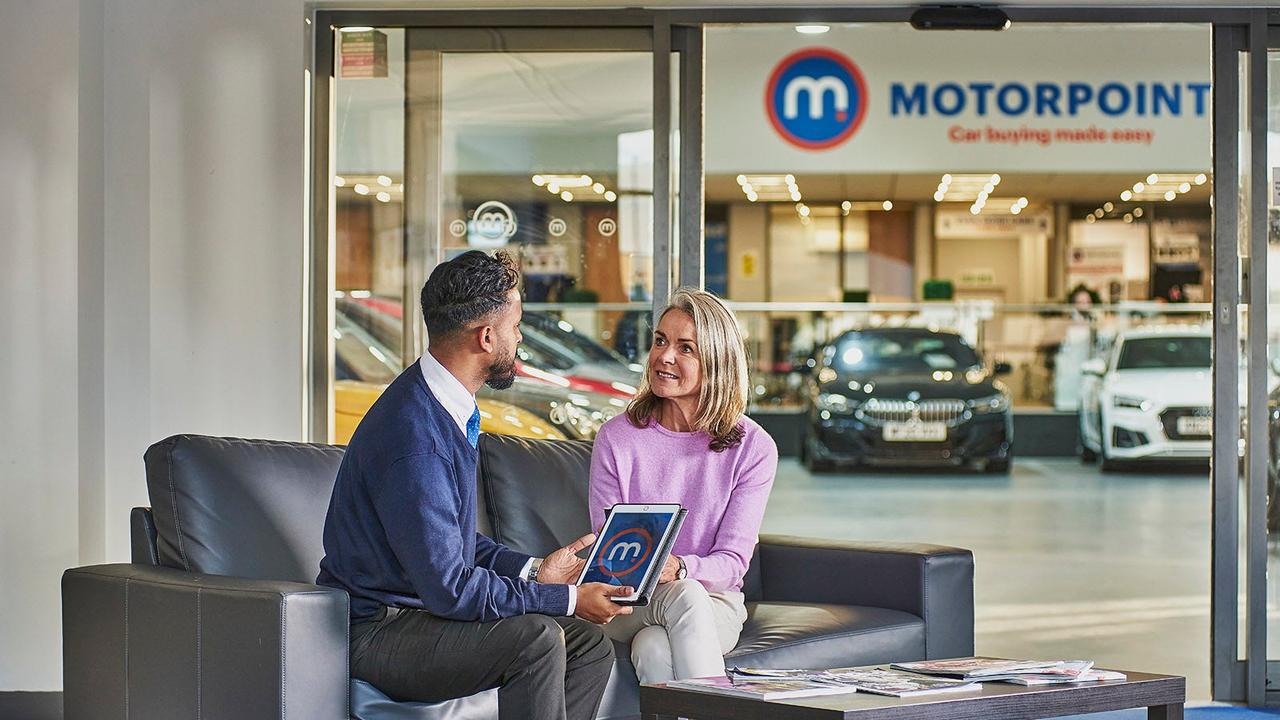
There are several ways you can buy a used car:
| Pros | Cons | |
| Paying the cash price/buying the car outright |
|
|
| PCP (Personal Contract Purchase) finance |
|
|
| HP (Hire Purchase) finance |
|
|
| Bank loan |
|
|
You should weigh up these options and pick the one that makes the most sense to you. It’ll help to consider how large of a monthly repayment your budget can handle, along with how much you might be able to put down as a deposit. Read our full guide to car finance options for details on each different payment type.
Can you test drive a used car?
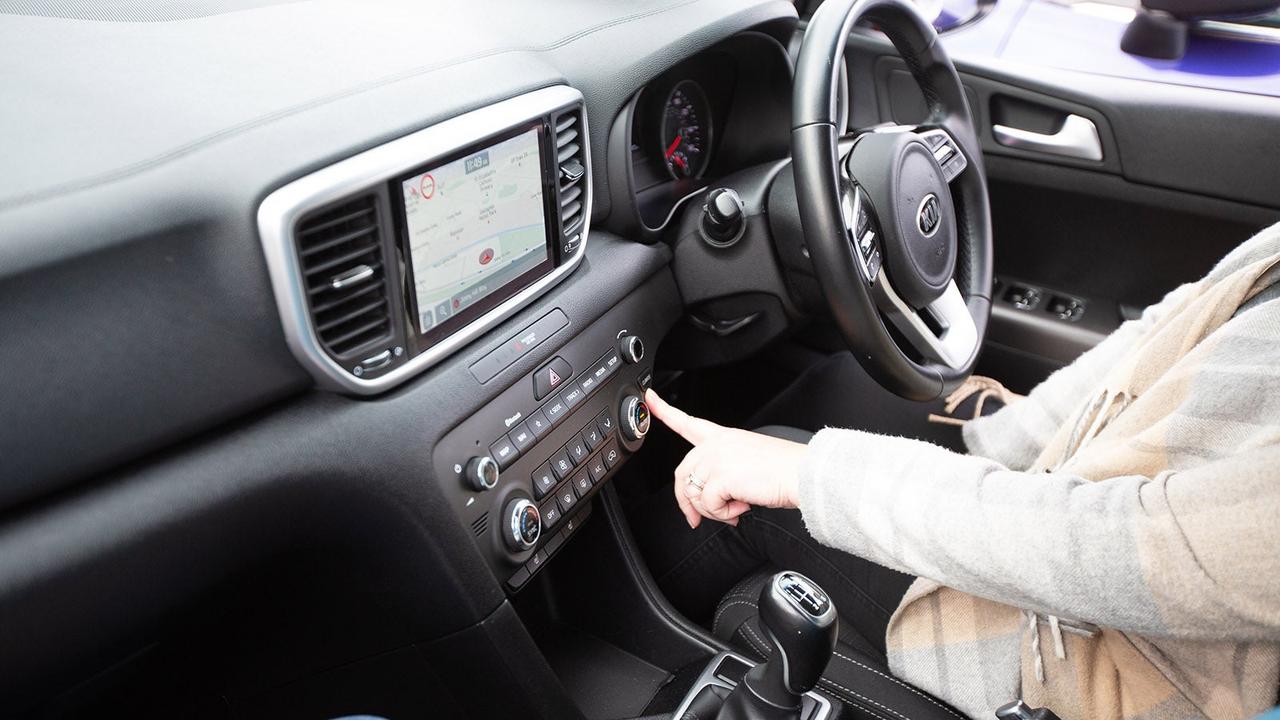
Yes, you can. In fact, we’d strongly advise against buying any car until you’ve test driven it. A test drive isn’t just for checking that everything’s working the way it should, it’s also an opportunity to see if you like the car, if you fit in it, and if you feel comfortable driving it.
What to check during a test drive
As you’re sitting in your potential next car and when you take it for a spin, here are the things you should be checking for to see if it’s a match made in heaven.
Before setting off
- Do you fit in it?
- That means can you get into a comfortable driving position, able to reach the steering wheel and pedals without feeling squashed or stretched out?
- Are the seats comfortable and do they support you when on the move?
- What large things might you need to carry in the boot?
- Will your other passengers be able to fit?
- If you’re a family buyer, will you be able to easily load child seats into the rear row, and will your pushchair fit in the boot? Luckily, a car store will usually let you test these things
- If you have older passengers or those with restricted movement, will they be able to get in and out without too much hassle?
- Do you know where all the controls on the dashboard are?
- Can you work out how you would adjust your climate control or activate cruise control, for example?
- Can you see how the wipers and lights work, and how to turn the front and rear demisters on?
- Is the infotainment system easy to use? Can you work out how to bring up maps or music from your phone on the car’s built-in system?
- Does everything work?
- Try all the functions and features such as the stereo, the sunroof, power windows and adjustable seats to make sure they function as intended.
On the road
- Do you find the car easy to drive?
- Are the controls easy to use?
- Is the steering accurate?
- On a manual, can you find the clutch’s bite point easily?
- On an automatic, does the car behave predictably when creeping at low speeds? Are you happy with how the car changes gear?
- Can you see out of it well enough to park confidently?
- Is it comfortable?
- Are you able to drive around without tensing up over potholes?
- Does it feel like it’s working properly?
- Are there any unusual noises when accelerating, steering, going over a bump or changing gear?
- Does the car track straight or does it pull to one side?
- Does anything in the car or its controls feel like they’re wobbling or vibrating on the move?
- Does the engine feel as powerful as you’d expect or does it feel sluggish, and are there any unusual noises while it’s running?
Buying a used car online
You can buy anything online, including used cars. In just a few clicks, a shiny used car could be on its way to your driveway.
The convenience of buying a used car online is clear – you don’t have to traipse around car showrooms, and you can browse used car listings at a time that suits you. Finance and warranties can be sorted out in the buying process.
But buying purely online means you don’t get to sit in the car and take it for a spin. Although the UK’s distance-selling regulations mean you have a period of time to return the car, we still see the value in experiencing a car before you buy it.
Best place to buy a used car
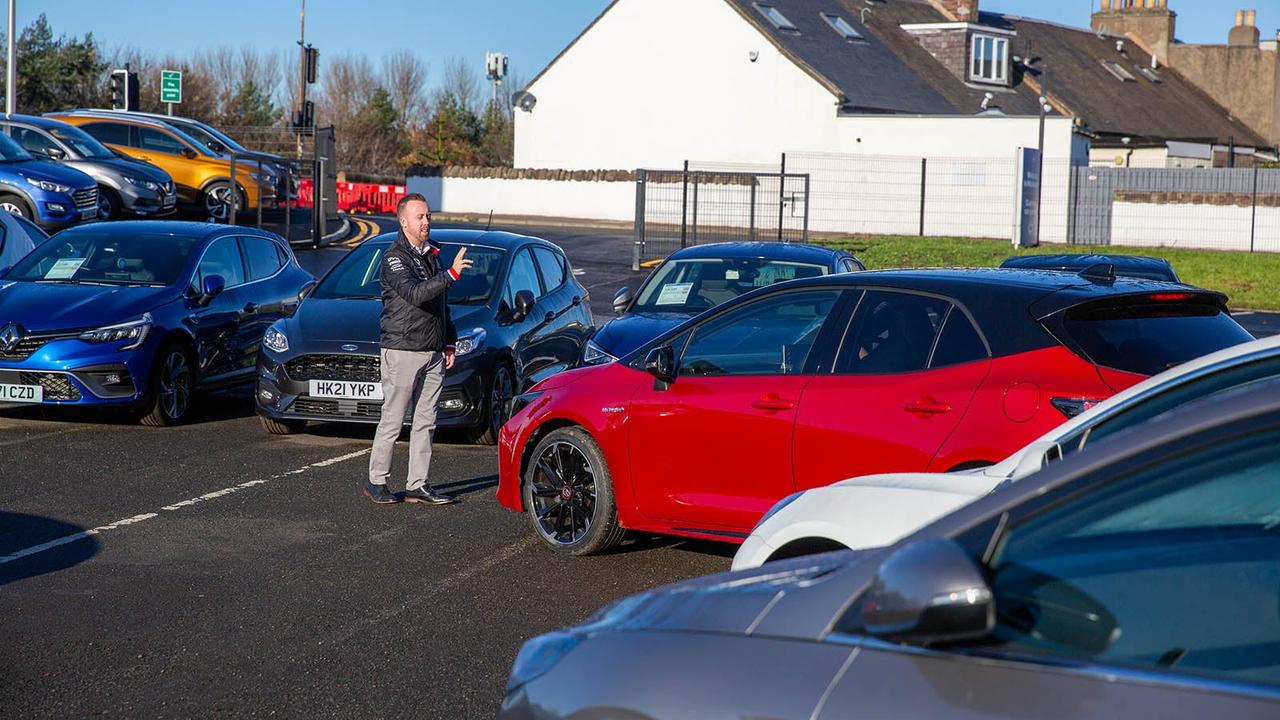
Buying from a private seller is an option if you’re paying the full amount of the car in one go, but you get much more protection buying from a trade seller. Jump to the ‘rights and protection’ section of this page for details.
A franchised dealership – e.g. a Mercedes dealer – may have more expert knowledge on the particular cars in their showroom, but they may have a small used car offering or higher prices.
A car supermarket is a great place to look at used cars – you get a wide choice of makes, models and body styles, all in one place, with convenient buying options. If you’ll let us toot our own trumpet, our Price Promise guarantee means you’ll never pay more on any of our thousands of used cars, and we’re rated Excellent on Trustpilot. And we make a mean cuppa.
What to look out for when buying a used car
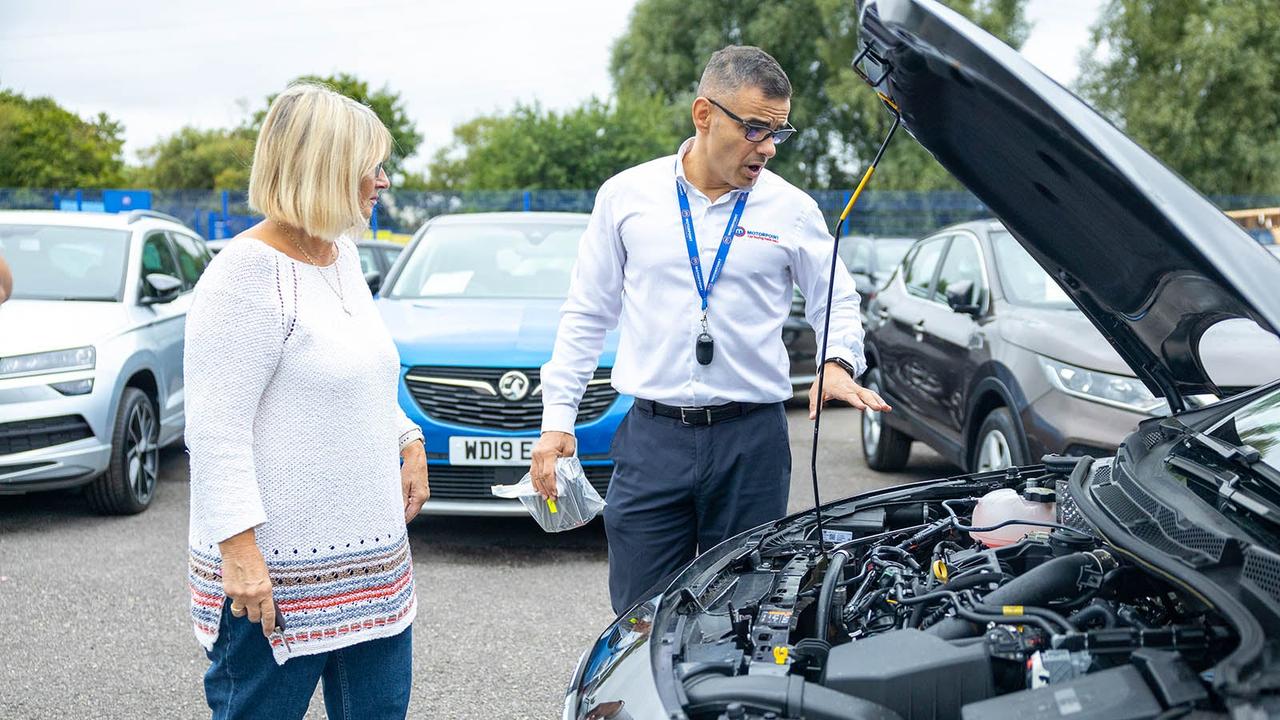
Most used car sellers take the effort to inspect the vehicle to make sure it’s in good condition before selling it. However, for ultimate peace of mind, this section will talk you through what to keep an eye out for when shopping for a used car. For even more info, take a look at our explainer for what to look for in a used car.
What physical checks should I carry out on a used car?
Assuming you’re not a mechanic yourself, most of the checks you’re able to carry out yourself are visual ones to make sure the car’s in a safe and roadworthy condition. Here’s a shortlist to get you started:
- Tyres
- Are they in good condition?
- Do they have a good amount of tread left?
- Wheels
- Are the wheels in good condition or is there damage from kerbs or potholes?
- Are they original to the car?
- If the wheels use locking nuts, can you find the tool to undo them?
- Brakes
- Are they in good condition or are there obvious signs of wear?
- Bodywork
- Are there any dents, dings or scratches that haven’t been repaired?
- Is there any rust or corrosion showing? Or any bubbling paint that might be hiding it?
- Do all the panels line up properly, or are any noticeably out of alignment?
- Are all the trim pieces, badges and styling touches present and correct?
- Lights
- Do they all work as intended?
- If powered by LEDs, are all the individual LEDs lighting up?
- Are the lenses fogged up?
- Interior
- Can you get into a comfortable driving position?
- Can you work out how to fold and adjust the passenger seats?
- Is it clean and undamaged?
- Are there any warning lights in the instrument panel?
What car history checks should I carry out?
There are several checks you can carry out before buying a used car to make sure it’s being sold as described.
A great place to start is an MOT history check. For cars that are three or more years old, their MOT results are recorded and are freely available via the Government’s website. This lets you see the MOT history of a vehicle including any failures it might’ve recorded and whether those were then rectified. It can also give an indication of the car’s mileage over time, allowing you to gauge how the car has been used over the years.
More detailed checks than the MOT history database are also available but these cost a small amount to access. These often cover a range of historical details on a car and can tell you if it was ever reported as stolen, if it was ever written off by an insurer, or if there’s any outstanding finance on the car. Motorpoint automatically carries out this check for every car it sells.
You might also want to check what service history a car has. This can help determine what kind of maintenance it has received over its life, and can maximise its value when you come to sell it on.
Do I get a warranty with a used car?
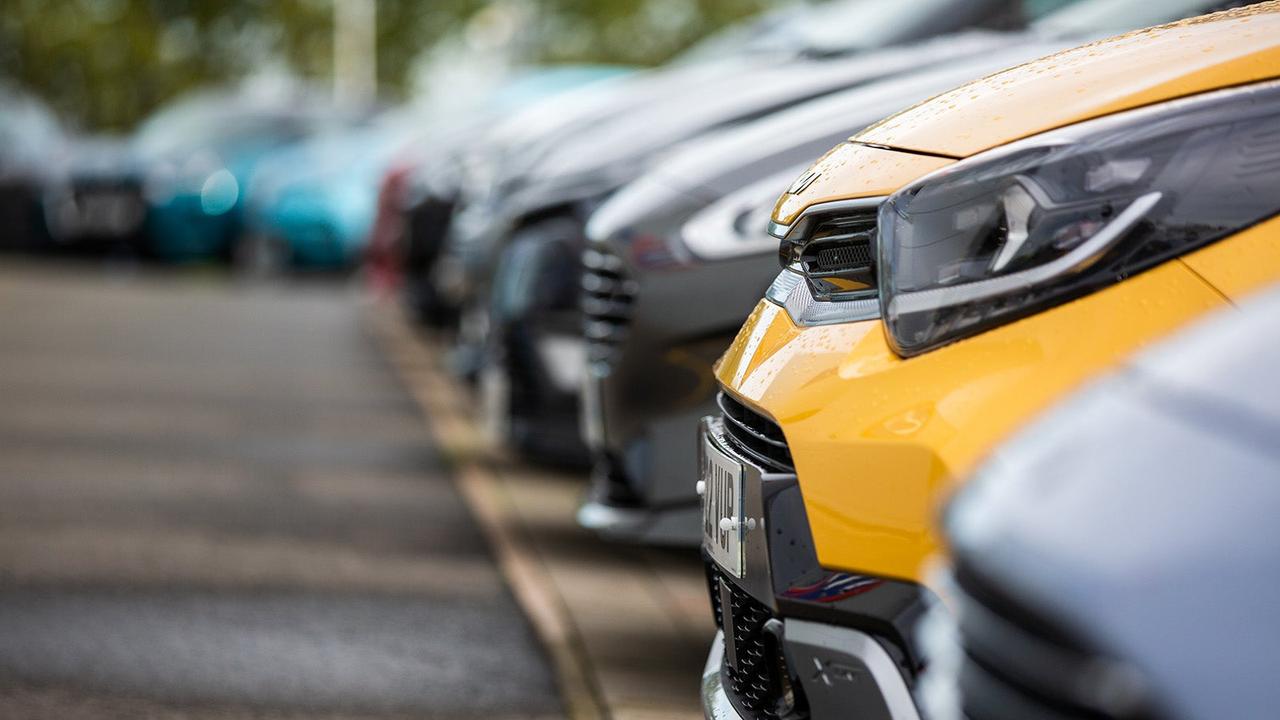
That depends on a number of factors. If you’re buying a nearly new used car, there’s a chance that a decent chunk of the original manufacturer’s warranty still applies to the vehicle you’re looking at. If you want the reassurance of a long factory warranty, read our guide to the best used cars with long warranties.
For older used cars, many dealers will include a short warranty at the point of sale – usually around three months. At this stage you’ll usually be given the opportunity to purchase an extended warranty, which covers the car for up to a year or longer. This might be worth considering if you don’t want to risk being hit with unexpected repair bills down the line. There are also third-party extended warranty providers that can offer continued coverage for your car.
What is good mileage on a used car?
Again, this depends on many factors. In many cases, the actual mileage figure matters less than the kind and the consistency of mileage the car has covered. Average annual mileage for UK drivers varies quite a lot with some covering as little as a few hundred miles per year, while others will drive many times as far.
Rather than worrying about the exact mileage figure, you’re better off keeping an eye out for outliers – that means cars that have done either an unusually small number of miles compared to their age, or an unusually high number. If you have access to a vehicle’s MOT history, you can also check roughly how consistent that mileage was – a car that regularly does 10,000 miles per year might be a safer bet than one that’s bounced between high usage and sitting unused for long periods.
What should I ask when buying a used car?
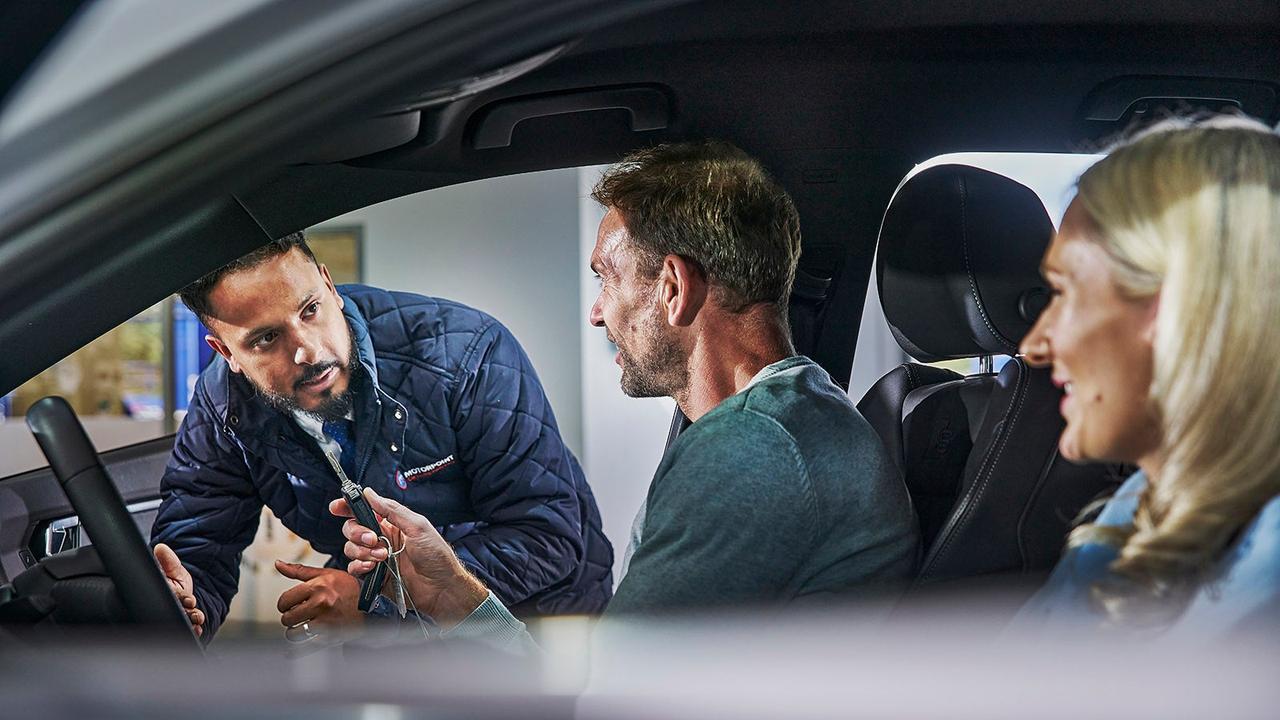
Knowing what to ask when buying a used car can give you more peace of mind because you won’t feel like you’re missing any key details. Here are the questions you should consider asking:
- Is there any damage on the car?
- Does everything on the car work properly?
- How many previous owners has the car had?
- How much life is left on the brakes and tyres?
- When is the car due a service?
- Have you carried out a history check and can I see the results?
- Can I take the car out on a test drive?
- Can I see the car’s paperwork, including its log book and any service history it has?
- What warranty is this vehicle being sold with?
What’s the best time to buy a used car?
With new UK registrations coming out in March and September each year, there’s potential that nearly new cars could be a little cheaper in February and August if dealers are trying to make space for new stock. But for buying a used car, you’re unlikely to see massive changes from one month to the next.
Make sure you set aside some time to buy a car – it’s usually not a five-second process, and it’s important not to rush or be hasty. Otherwise, you could end up with a car that doesn’t really suit your needs or wants.
What rights and protection do I have when buying a used car?
There are several schemes in place to offer you a level of protection when buying a used car. You’re primarily protected by the 2015 Consumer Rights Act, which entitles you to ask for a refund within 30 days of buying a used car if it fails to meet any of the following three criteria:
- It must be of satisfactory quality that can be expected for its age, mileage and price range
- It must be fit for purpose – i.e. if you’re told a car can do something it can’t
- It must be as described, meaning all the listed equipment should be present and correct
The Consumer Rights Act still applies beyond the 30-day window but, beyond that point, it can be very difficult to prove that any fault that arises was present when the car was sold. If you’re buying a used car from a private seller, you have very little protection if there’s a problem, so you’ll need to be extra diligent when carrying out checks on the car.
Shop a fantastic range of nearly new cars
If you want to buy a great value car without the hassle, take a look at Motorpoint’s huge selection of nearly new cars for sale.




































%20copy.jpg&w=744&q=75)
